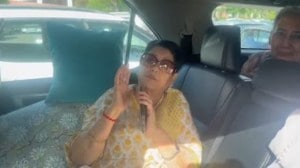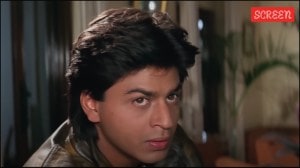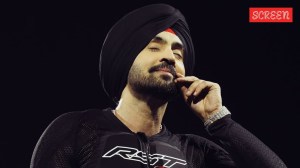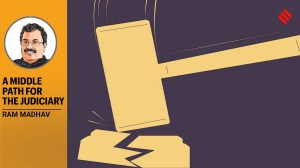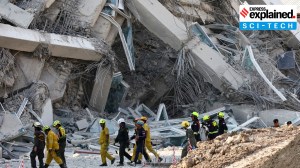From the Urdu Press: ‘Muslims have showed restraint, but govt priority seems to be Aurangzeb’s grave’, ‘Gadkari pitch for Muslim uplift welcome’
“Chandrababu Naidu must rise (over delimitation) in the interest of the South. The Centre should address the South's worries and press the pause button on the exercise until a consensus is reached,” writes Siasat.
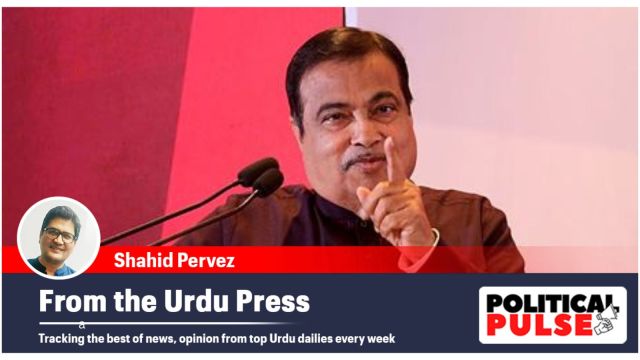 Roznama Rashtriya Sahara flagged Gadkari’s speech at a recent event in Nagpur. (Express file photo/ Rohit Jain Paras)
Roznama Rashtriya Sahara flagged Gadkari’s speech at a recent event in Nagpur. (Express file photo/ Rohit Jain Paras)As the spectre of Aurangzeb returned to haunt the country’s political discourse, the Urdu dailies focused on its fallout in Nagpur, which was convulsed by violence following protests by some right-wing outfits demanding razing of the 17th century Mughal Emperor’s tomb in Khuldabad. The dailies pointed out how similar demands had been raised by several Mahayuti leaders and even ministers, which vitiated the atmosphere in the lead-up to the violence. Questioning the relevance of Aurangzeb now, they called for fair and impartial action against the perpetrators of the violence while applying a healing touch to the frayed social fabric.
URDU TIMES
Referring to the Nagpur violence, the Mumbai-based Urdu Times, in its March 19 editorial, points out that the city does not have a history of communal discord and that one of its constituencies is represented by Chief Minister Devendra Fadnavis, who also holds the Home portfolio.
“It is unfortunate that the divisive game being played in Maharashtra in recent months over Aurangzeb culminated in the Nagpur violence,” the daily writes. CM Fadnavis says the violence was a consequence of a “pre-meditated conspiracy”, it says, adding that the protests held by the VHP and Bajrang Dal to press for dismantling of Aurangzeb’s tomb followed the release of the Bollywood film Chhaava, which shows the atrocities committed by Aurangzeb against Chhatrapati Sambhaji Maharaj, the son of Chhatrapati Shivaji Maharaj. “The film’s depiction of history is controversial, which gives fillip to divisive forces just like the movie Kashmir Files did. The Muslim community maintained restraint, even as tension kept simmering before hitting a flashpoint,” the edit says.
Holding that there could not be any rationale for holding protests over Aurangzeb now, the editorial says the government should have taken preemptive action against elements bent on creating communal enmity. “On the contrary, CM Fadnavis himself said that he also favours removal of Aurangzeb’s tomb, but that his government’s hands were tied since the previous Congress government had put it under the protection of the Archaeological Survey of India (ASI),” it states.
A section of the media whipped it up as if there are no other issues left to be tackled, the edit says. “The entire plan was aimed at diverting public attention from the real issues. Many farmers have died by suicide in Maharashtra due to distress. The state’s debt has rocketed to Rs 9.32 lakh crore. The Mahayuti government has slashed the allocation for its flagship Ladki Bahin scheme for this year. And then, there are persisting problems like price rise and unemployment,” the edit says. “But the government’s priority seems to be Aurangzeb’s grave, not development. This is to fend off questions about public issues concerning daily life that involve water, power, education, hospital and jobs.”

ROZNAMA RASHTRIYA SAHARA
Highlighting senior BJP leader and Union Minister Nitin Gadkari’s pitch for the crucial role of education in the uplift of Indian Muslims, the New Delhi edition of Roznama Rashtriya Sahara, in its March 18 leader, writes that there had been political stalwarts like Atal Behari Vajpayee and Sushma Swaraj. Rising above narrow political lines to champion India’s pluralistic ethos or Ganga Jamuni tehzeeb, they maintained that all Indians, regardless of religion, caste and creed, must progress and that only then would India become a developed country, the edit says. “Gadkari also seems to have emerged as such a leader, who has periodically reached out to the Muslim community, boosting their morale and giving them positive suggestions for their development,” it says. “Gadkari is among a few bipartisan leaders who are popular among all communities and in both the ruling and Opposition camps. He is a candid politician who expresses his views freely, even ignoring its political consequences.”
The editorial flags Gadkari’s speech at a recent event in Nagpur where he said: “The section which needs education the most is the Muslim community.” Gadkari said Muslims had been engaged in professions like “running tea stalls, paan shops, scrap dealing, and truck driving and cleaning”, urging the community to embrace science and technology, focus on education and become engineers, doctors, IAS and IPS officers. Gadkari cited the achievements of former President A P J Abdul Kalam, saying a person becomes great on the basis of his or her qualities, the edit adds. “Gadkari recalled how as an MLA he had helped a Muslim organisation Anjuman Islam get an engineering college to promote education among Muslims.”
The daily says Gadkari’s advisory to Muslims should be considered seriously by the community. “Gadkari has made it clear that if Muslim students progress, it would help in the country’s advancement. He knows that the real meaning of being a well-wisher of the country is being a well-wisher of all communities. Those lagging behind on the development front must be extended all assistance for their empowerment. Just demonising the minority community is not going to change the situation,” it states.
The edit says it is a matter of another debate why Muslims are educationally backward — is the community itself responsible or there could be other reasons for it as well. “If there were more leaders like Gadkari, then the authorities would have given more priority to opening schools in Muslim areas rather than setting up police stations there.”
SIASAT
Referring to the meeting of the Chief Ministers and other leaders of several Opposition-ruled states on delimitation, hosted by Tamil Nadu CM and DMK president M K Stalin in Chennai, the Hyderabad-based Siasat, in its March 24 editorial, states that the southern states are concerned that the proposed redrawing and reallocation of the constituencies on the basis of population alone would shrink their representation in the Lok Sabha. “The South fears that this would further reduce their influence and heft in national politics while enhancing the dominance of North and Central India,” it says. “A section of the South has also accused the Centre of trying to impose Hindi on them. The South has its own distinct culture and identity, whose cornerstone is their language.”
The editorial points out that while three CMs and one Deputy CM from four southern states attended the Chennai conclave, Andhra Pradesh CM and TDP president N Chandrababu Naidu skipped it. “Naidu is a key NDA ally. Although he is also concerned over the impact of delimitation on the South, he cannot raise it openly. It is another matter that he has also started urging the people of his state to have more children to increase its population,” it says. The southern states are fearing a weakening of their political representation and voice because of their successful implementation of the Union government’s population control policies, the edit notes, adding that on the other hand the northern and central states would be the gainers despite their failings on the demographic front. “There is a disquiet in the South that the BJP favours population-based delimitation as it is dominant in the northern and central states, which would be the major beneficiaries of the exercise.”
The daily says Naidu should review his stand and join hands with other southern CMs over delimitation. “The TDP chief must rise in the interest of the South,” it states. “The Centre should address the South’s worries and press the pause button on the exercise until a consensus is reached.”
Must Read
Buzzing Now



Mar 29: Latest News
- 01
- 02
- 03
- 04
- 05


